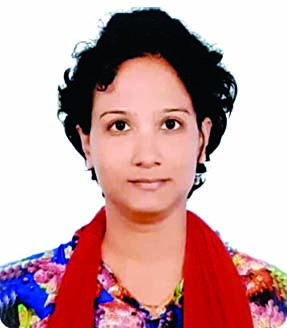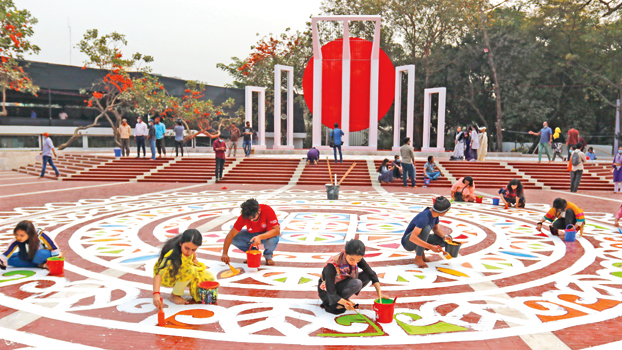Highlights of Ekushey February


Although the Language Movement reached its peak on February 21 in 1952, some students embraced martyrdom on that day, Bengalees had started raising voice for establishing `Bangla" as the state language long before.
In 1911, at the Provincial Education Conference held at Rangpur, Syed Nawab Ali called for giving Bangla the national status as it was one of the major languages of the Indian sub-continent.
In 1918, Dr. Mohammad Shahidullah said Bangla be recognised as a general language of India while speaking at a programme at Bishwa Bharari
In 1937, Maulana Akram Khan demanded declaration of Bangla as the `State Language of India' at a meeting of Bangiya Sahitya Parishad. In 1942, a `Renaissance Society' was formed which introduced the concept that Bengal was a `distinct' state. In 1943, the Society demanded the announcement of Bangla as the `State language of the region.'
On July 29, 1947 Dr. Mohammad Shahidullah strongly criticised the proposal of the Vice-Chancellor of Aligarh University that Urdu should be the State Language of Pakistan.
Tamaddun Majlish, after the creation of Pakistan in August 1947, picked up the issue in September and on 15th of November, it published a booklet titled "Which is to be the State Language of Pakistan- Urdu or Bangla".
Later in November, 1947, the Central Government of Pakistan started the using Urdu as the official language of the state.
The demand for making Bangla the state language became stronger when people took to the streets in December 1947. President of East Pakistan Provincial Muslim League Maulana Akram Khan declared: "There will be a revolution in East Pakistan if any language except Bangla was named as the state language of Pakistan.
The following day a rally demanding the announcement of Bangla as one of the state languages was held for the first time on the Dhaka University campus.
Organised by Dhaka University Central Students' Union (DUCSU) with Principal Abul Kashem in the chair, it was addressed, among others, by Munir Chowdhury, Abdur Rahman Chowdhury, Kalyan Das Gupta, A K Ahsan and S Ahmed. The meeting, in a resolution, said that "Bangla should be recognised as the state language of Pakistan Dominion and the official language of East Pakistan.
In the later part of December, Professor Nurul Haque Bhuyian was made President of the first Rastra Bhasha Sangram Parishad (State Language Movement Council) of Tamaddun Majlish.
The Language Movement got a boost on February 25, 1948, when Advocate Dhirendranath Dutta, a member of the Constituent Assembly of Pakistan from Cumilla, moved a motion in Parliament proposing Bangla as the state language.
On February 27, 1948, students of Dhaka University demonstrated against the remarks of Liaquat Ali.
On March 3, 1948, the State Language Sub-Committee of Tamaddun Majlish and East Pakistan Muslim Chhatra League jointly called a nation- wide general strike on March 11.
The Pakistan government issued a statement terming the general strike as a conspiracy to create misunderstanding among the Muslims.
But the city dwellers held a massive demonstration protesting the government decision. Police arrested Bangabandhu Sheikh Mujibur Rahman, Kazi Golam Mahbub and some DUCSU leaders from the procession.
The next day, students observed strike at Jagannath College. As a protest, strike was observed on March 13 in all educational institutions, including Dhaka University.
On March 20, Governor General of Pakistan Mohammad Ali Jinnah came to Dhaka. The next day, he announced at a rally at Race Course Ground that "Urdu and Urdu shall be the only state language of Pakistan."
On March 24, when Jinnah reiterated his statement at the convocation of Dhaka University, the students strongly protested and shouted “No, No.” Leaders of Rastra Bhasha Sangram Parishad met Jinnah and tried to convince him that their movement was not launched from the spirit of narrow provincialism, nor was it provoked by India as had been alleged by the government.
On March 27, 1948, Prime Minister of Pakistan Liaquat Ali Khan had called the student movement a `narrow provincialism'.
On April 2, 1948, East Pakistan Provincial Assembly adopted a resolution proposing the National Assembly to declare Bangla as the state language.
Henceforth, the students and youths began to observe March 11 as the State Language Day every year.
On December 31, 1948, Dr. Shahidullah, speaking at the East Pakistan Literary Conference, said: “It's true that we are Hindus or Muslims, but it is more than that, we are Bangalee. It is not an ideology, but reality.”
In March 1949, Bangla Department of Dhaka University came up with an official protest over the proposal to write Bangla in Arabic script.
A charter of demands was submitted to Liaquat Ali Khan on behalf of DUCSU urging him to announce Bangla as the state language during his visit to Dhaka as the Prime Minister of Pakistan.
On January 25, 1951 women students of Dhaka Medical College called a strike. On February 15, a strike was observed in all educational institutions of Dhaka in support of the students of Dhaka Medical College. On March 11, 1951, strike was observed on Dhaka University campus in observance of the Language Day.
On January 26, 1952, Governor General Khwaja Nazimuddin visited Dhaka and the next day at a rally at Paltan Maidan he repeated Jinnah's statement on Urdu. Dhaka University students instantly demonstrated to protest Nazimuddin' statement.
Next day, Sarbodalio Rastra Bhasha Parishad (All Party State Language Council) was formed with intellectuals, political leaders and student leaders from all levels.
On January 31, a meeting of All Party State Language Action Committee was held at Dhaka Bar Library with Awami League President Maulana Abdul Hamid Khan Bhasani in the chair. On February 4, 1952, a strike was observed in all educational institutions of Dhaka.
About 10,000 students brought out a protest rally. The All Party Action Committee headed by Awami League President Maulana Bhasani called a general strike on February 21.
The government imposed Section 144 banning assembly of more than five persons.
On February 21, 1952, the student leaders of Dhaka University decided to break Section 144 at a rally presided over by Gaziul Haque.
That day, the Bangalee nation gave a stunning blow to the Pakistani autocrats.
Police first tried to pick up the agitating students and then fired gunshots indiscriminately. Four persons, including three students- Abdul Jabbar, Abul Barkat and Rafiquddin Ahmed- were killed, 17 were critically injured and at least 52 were arrested.
Among others, Anwarul Islam, Faiaz, Sirajuddin Khan, Abdus Salam, SA Motaleb, Elahi Box, Mansur Ali, Bashiruddin Ahmed, Tahajud Islam, Shamsur Rahman, Akhtaruzzaman, A Razzaq, Mozammel Haque and Sultan Ahmed sustained bullet injuries.
Following the incident of February 21, the Pakistani rulers were forced to declare Bangla as one of the state languages of Pakistan.
The victory of the mother language was won at the cost of lives and bloods.
On February 16, 1956, the United Front Government in East Pakistan led by Abu Hussain Sarker announced February 21 as the "Shaheed Day". The day was also declared a Public Holiday.
The Pakistani rulers tried to avenge their defeat in 1952. In 1959, the military regime of Ayub Khan cancelled the February 21 national holiday. But in 1969, following a mass upsurge, the government again was forced to introduce the day as Shaheed Day and Public Holiday.
The grateful nation had immediately erected a monument in memory of the martyrs of the Language Movement at the spot where the students and youths had sacrificed their lives to protect the honour of their mother language- Bangla.
It is called "Shaheed Minar" and has become the symbol of national unity and integrity.



